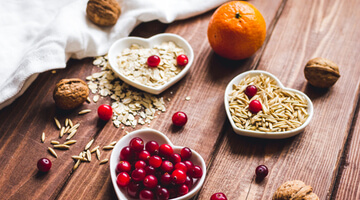Heart Month – Heart Maintenance Foods

It is that month of the year to take your heart health into your own hands all year. So start by adding these foods to your diet.
Dark Chocolate
Studies show that people who consume cocoa—as a hot drink or as dark chocolate 70% have a much better cardiovascular health than those who don’t. Cocoa’s health benefits come from polyphenols and flavanols, anti-inflammatory compounds that help protect the heart.
Edamame
A great anytime snack because they’re an excellent source of magnesium, folate, and potassium. These nutrients help lower blood pressure and support heart health, reducing your risk for heart disease. They are high in fiber that protects the heart by boosting the body’s ability to produce low-density lipoprotein (LDL) receptors, which absorbs “bad” cholesterol out of the blood.
Rooibos Tea
Rooibos tea (caffeine free) contains flavanoid called Aspalathin. Research shows this compound is perfect for your heart health, it reduces stress hormones that trigger hunger and fat storage.
Tomatoes
Tomatoes are rich in lycopene, an antioxidant that increases after cooking and processing. Dozens of studies suggest a relationship between regular intake of lycopene-rich tomatoes and a lower risk of cardiovascular disease, skin damage, and certain cancers.
Walnuts
Walnuts are rich in antioxidants and omega-3 fatty acids that can significantly reduce the risk of heart disease (heart attack and stroke) Research proved that consuming just one 30g of walnuts five times a week decreases heart disease risk by nearly 40 %!
Chia Seeds
Chia Seeds raise good HDL cholesterol levels. They are rich in Omega-3s that protect the heart by lowering blood pressure, bad cholesterol and inflammation. So by eating chia seeds, you can boost and protect your heart thanks to the omega-3s
Garlic
Garlic has heart-healthy antioxidant activity, and it reduces the plaque buildup in the arteries.
Yogurt
According to the American Heart Association people who consume 200g yogurt every three days, have a 31 % lower incidence of hypertension.
Yogurt also reduces risk of hypertension. Rich in 2 essential nutrients: vitamin D, and calcium. But stay away from all flavored yogyrt!!
Peanuts and unsweetened Peanut Butter
Peanuts contain high amounts of resveratrol—the heart-healthy phytonutrient found in red wine.. They are a great source of fiber and healthy fat, which can help decrease inflammation in the body and also aid digestion.
Wild Salmon
Wild salmon is rich in heart-healthy omega-3s but beware of the farmed pink variety.
Avocado
Packed with a solid dose of monounsaturated and polyunsaturated fats that help lower LDL (bad cholesterol) as well reduce your risk for cardiovascular disease and inflammation.
Kale
Kale is an anti-inflammatory superfood. With only 33 calories per cup yet manages to pack in a solid amount of fiber, anemia-fighting iron, fat-soluble vitamins K, A, C, and bone-building calcium.
Almonds
Rich in magnesium and antioxidants, it can protect your heart by lowering LDL levels and promoting better blood sugar levels, and blood pressure control.
Berries
Berries are rich in antioxidants which help protect from free radical damage. These free radicals could potentially increase risk of heart disease and cancer. They are also an excellent source of fiber and they do not produce sugar spikes which could lead to insulin resistance.
Ginger
Ginger reduces total cholesterol, LDL, and very low-density lipoprotein (VLDL) thanks to high content of gingerols, compounds that are antioxidant, anti-inflammatory, and antibacterial.
Oats
Oatmeal one of the healthiest foods for your heart. It reduces LDL (“bad” cholesterol) and Apolipoprotein B, which carries bad cholesterol through the body. High in fiber that will keep you feel full
Buckwheat – Kasha
Although quinoa seems to be a popular grain choice these days, Buckwheat, is a hearty grain that deserves a spot on your plate. It’s rich in heart-healthy omega-3 fatty acids, high in protein (nearly 10 grams per cup!) and has a ton of heart-healthy fiber.
While most people think of buckwheat as a whole grain, it’s actually a seed that is high in both protein and fiber. It supports heart and heart health and can help prevent diabetes and digestive disorders. … Despite its name, buckwheat actually doesn’t contain any wheat or the protein gluten.